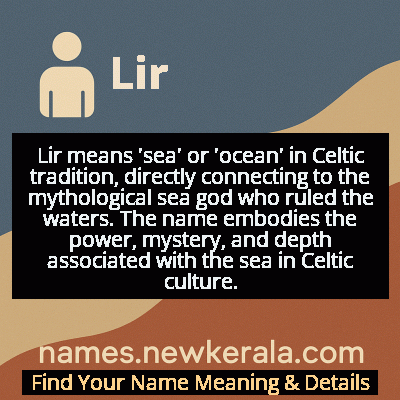Lir Name Meaning & Details
Origin, Popularity, Numerology Analysis & Name Meaning of Lir
Discover the origin, meaning, and cultural significance of the name LIR. Delve into its historical roots and explore the lasting impact it has had on communities and traditions.
Name
Lir
Gender
Male
Origin
Celtic
Lucky Number
3
Meaning of the Name - Lir
Lir means 'sea' or 'ocean' in Celtic tradition, directly connecting to the mythological sea god who ruled the waters. The name embodies the power, mystery, and depth associated with the sea in Celtic culture.
Lir - Complete Numerology Analysis
Your Numerology Number
Based on Pythagorean Numerology System
Ruling Planet
Jupiter
Positive Nature
Optimistic, inspirational, and creative.
Negative Traits
Scattered, exaggerating.
Lucky Colours
Yellow, gold, purple.
Lucky Days
Thursday.
Lucky Stones
Yellow sapphire.
Harmony Numbers
1, 2, 9.
Best Suited Professions
Arts, writing, communication.
What People Like About You
Creativity, optimism.
Famous People Named Lir
Lir of the Tuatha Dé Danann
Mythological Sea God
Ruler of the sea in Irish mythology, father of the Children of Lir
Lir O'Donnell
Gaelic Chieftain
Leader of the O'Donnell clan in Ulster during the Tudor conquest of Ireland
Lir MacCarthy
Scholar and Poet
Preserved ancient Gaelic manuscripts and composed poetry in the Irish language
Lir Byrne
Modern Artist
Celtic-inspired painter known for mythological themes and ocean landscapes
Name Variations & International Equivalents
Click on blue names to explore their detailed meanings. Gray names with will be available soon.
Cultural & Historical Significance
The name Lir embodies the Celtic reverence for the sea as both a life-giving force and a realm of mystery and danger. Throughout Celtic regions, particularly in Ireland and Wales, Lir represents the ancient connection between land and sea, reflecting a culture that viewed the ocean as both a pathway to other worlds and a source of spiritual power. His legacy persists in place names, literary references, and the continued cultural importance of sea mythology in Celtic nations. The character appears in various medieval manuscripts and has influenced artistic and literary works for centuries, maintaining his status as one of the most recognizable figures in Celtic mythological tradition.
Extended Personality Analysis
Individuals named Lir are often perceived as possessing a deep, contemplative nature reminiscent of the ocean itself. They tend to be emotionally complex, with calm exteriors that can mask powerful undercurrents of feeling and intuition. Like the sea they're named for, they may appear serene on the surface while harboring great depth and intensity beneath. This oceanic connection often manifests as strong intuition, emotional wisdom, and the ability to navigate complex emotional landscapes with grace.
Lirs typically demonstrate remarkable resilience and adaptability, able to weather life's storms while maintaining their core identity. They often possess natural leadership qualities combined with a protective instinct toward those they care about, much like the mythological Lir watching over his transformed children. Their personality often balances between solitary reflection and deep family connections, valuing both independence and intimate relationships. The name suggests someone who is both mysterious and profoundly loyal, capable of great emotional depth while maintaining an air of dignified reserve. These traits reflect the dual nature of the sea—both nurturing and powerful, constant yet ever-changing.
Modern Usage & Popularity
In contemporary times, Lir remains a relatively rare but meaningful choice, primarily used within Celtic communities and by parents seeking names with mythological depth. Its usage has seen a slight increase in recent years as part of the broader trend toward reviving ancient and mythological names. The name is particularly popular in Ireland, Scotland, and among the Irish diaspora, where it serves as a connection to cultural heritage. While not common enough to appear on most popular baby name lists, Lir has gained recognition through cultural festivals, literary references, and the growing interest in Celtic spirituality. Modern parents choosing this name often appreciate its strong mythological associations, unique sound, and connection to nature through its sea-related meaning. It's occasionally used as a middle name when parents want a distinctive Celtic name without being too unconventional for daily use.
Symbolic & Spiritual Meanings
Symbolically, Lir represents the vast, mysterious nature of the ocean and all it encompasses—depth, emotion, intuition, and the unconscious mind. The name carries connotations of transformation and endurance, drawn from the myth of his children who survive 900 years as swans. It symbolizes the cyclical nature of life, the power of memory and storytelling, and the idea that true identity persists through profound change. Like the sea, Lir represents both calm serenity and powerful emotional currents, suggesting someone who can navigate life's challenges with wisdom and resilience. The name also embodies protection and paternal care, reflecting Lir's mythological role as a father who never abandons his transformed children. In broader symbolic terms, Lir connects to themes of journey, exploration, and the boundary between known and unknown realms, much like the sea separating the mortal world from the Otherworld in Celtic belief.

